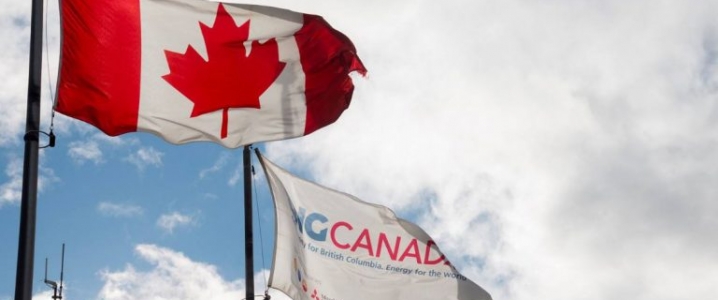A new era of mega LNG projects could be upon us.
Royal Dutch Shell just gave the go-ahead to a massive LNG export project on Canada’s Pacific Coast, a strong signal that the period of oversupply in the global LNG market has come to an end.
The decision comes less than a week after Qatar announced a major LNG expansion, a decision to build a fourth LNG train in addition to three LNG trains already in the works. Taken together, Qatar is set to significantly expand its LNG export capacity by more than 40 percent, rising from 77 million tonnes per year (mtpa) to 110 mtpa by the mid-2020s.
But Shell’s LNG Canada project is a more notable development, for several reasons. For one, Shell is not a state-owned company, so its decision is devoid of geostrategic priorities. In that sense, it more closely reflects the belief that the LNG market has decidedly rounded a corner. Second, and more importantly, LNG Canada is a greenfield project, not an expansion of an existing site. That is also a testament to the company’s confidence in rising LNG prices and strong demand for the foreseeable future.
“As the market grows, our LNG business needs to grow,” Shell Chief Financial Officer Jessica Uhl said in a call with reporters. “Demand has exceeded expectations. We believe that that pattern will continue going into 2020s.”
It wasn’t too long ago that global LNG markets looked oversupplied. A wave of export terminals were planned and brought online in the early part of this decade, super-charged by sky-high landing prices for LNG following the 2011 Fukushima meltdown and the shuttering of Japan’s nuclear fleet, which led to soaring demand for imported gas. High prices in Asia resulted in a proliferation of planned LNG export terminals around the world. Related: European Natural Gas Prices Are Set To Rise Further
However, the oil market downturn in 2014 unfolded just as some export terminals planned years earlier were coming online. LNG prices have historically been linked to crude oil prices, so the crash in oil dragged down LNG. The glut of LNG export capacity also pushed the market into a deep slump, and many analysts predicted that a rebound would not arrive for years, perhaps even as long as a decade. Shell delayed its final investment decision on LNG Canada multiple times over the past few years, most recently in 2016 during the depths of the downturn.
Two years on, the LNG market looks dramatically different. China is in the midst of an LNG buying spree, helping to soak up a lot of excess supply. Also, a series of smaller nations, particularly in Southeast Asia, are also buying more imported gas. And the proliferation of import and regasification facilities have broadened the market and increased import demand faster than many had expected.
As a result, there could be a shortage of LNG supply as soon as 2022, according to Sanford C. Bernstein & Co., which means it is the “right time” for new investment, as Shell’s CFO put it. “Ultimately, this is the start of a major LNG investment wave,” Bernstein analysts said in a recent note.
Against that backdrop, Shell’s FID is a potent symbol of a market that has tightened dramatically. “We believe 2019 could be the busiest year of LNG FIDs ever,” Wood Mackenzie’s director of North America gas, Dulles Wang, said, according to Reuters.
There are a few other reasons why the project is notable. For Canada, the LNG export terminal is set to be the largest infrastructure project in the country’s history. It will consist of two LNG trains capable of shipping 14 mtpa. Shell and its partners will consider an expansion in the future that would roughly double that capacity.
Second, the gas has to come from somewhere. In a related but separate announcement, TransCanada Corp. said that it would move forward with developing the Coastal GasLink pipeline, a 420-mile project that will carry natural gas from the emerging Montney Shale to the Pacific Coast at Kitimat. The pipeline is supposed to come online in 2023 and Shell’s LNG export terminal will enter into service before 2025. Taken together, the pipeline and the export terminal could unlock vast new gas reserves in the Montney shale. Related: Why The Saudis Can’t Keep A Lid On Oil Prices
Also, a new Pacific frontier for LNG could spell bad news for the Gulf of Mexico. As Bloomberg notes, shipping LNG from Canada’s Pacific Coast means that cargoes can arrive in Tokyo in eight days, a huge advantage compared to the roughly 20 days that it takes a shipment to travel from the U.S. Gulf Coast.
To top it off, China just slapped a 10 percent tariff on U.S. LNG, further damaging the competitiveness of gas exports. Qatar’s recent LNG expansion should also be viewed as part of the race to capture the Chinese market, one in which U.S. LNG developers appear to be losing ground.
Shell’s decision to greenlight the new LNG terminal in Canada may seem like a project that is unique to Shell, but the fallout from the FID will be felt globally.
By Nick Cunningham of Oilprice.com
More Top Reads From Oilprice.com:
- Oil Slumps On Major Inventory Build
- Gazprom's Bid To Maintain European Energy Dominance
- Permian Producers Have A Power Problem



















Not the best place in the world to die up your money and watch it die under red tape and new green regulations.